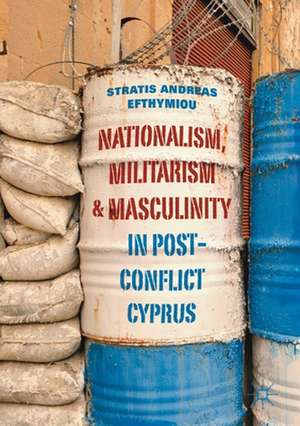Nationalism, Militarism and Masculinity in Post-Conflict Cyprus
Autor Stratis Andreas Efthymiouen Limba Engleză Paperback – 14 aug 2020
Nationalism, Militarism and Masculinity in Post-Conflict Cyprus draws on rich field-research, with soldiers and officers in army barracks, politicians such as former President of Republic of Cyprus Glafkos Clerides, leaders of radical far-right movements and the Greek Cypriot public. The book offers invaluable insight into the application of nationalism, militarism and masculinity in governmental policy including by the Cyprus Defence Ministry, and will be of interest to students and scholars in sociology, gender studies, peace studies, security studies, politics and international relations, as well as governments and NGOs.
| Toate formatele și edițiile | Preț | Express |
|---|---|---|
| Paperback (1) | 525.54 lei 6-8 săpt. | |
| Springer International Publishing – 14 aug 2020 | 525.54 lei 6-8 săpt. | |
| Hardback (1) | 529.78 lei 6-8 săpt. | |
| Springer International Publishing – 10 iul 2019 | 529.78 lei 6-8 săpt. |
Preț: 525.54 lei
Preț vechi: 618.27 lei
-15% Nou
Puncte Express: 788
Preț estimativ în valută:
100.56€ • 105.29$ • 83.41£
100.56€ • 105.29$ • 83.41£
Carte tipărită la comandă
Livrare economică 10-24 aprilie
Preluare comenzi: 021 569.72.76
Specificații
ISBN-13: 9783030147044
ISBN-10: 3030147045
Pagini: 261
Ilustrații: XIV, 261 p. 1 illus.
Dimensiuni: 148 x 210 mm
Greutate: 0.36 kg
Ediția:1st ed. 2019
Editura: Springer International Publishing
Colecția Palgrave Macmillan
Locul publicării:Cham, Switzerland
ISBN-10: 3030147045
Pagini: 261
Ilustrații: XIV, 261 p. 1 illus.
Dimensiuni: 148 x 210 mm
Greutate: 0.36 kg
Ediția:1st ed. 2019
Editura: Springer International Publishing
Colecția Palgrave Macmillan
Locul publicării:Cham, Switzerland
Cuprins
1. Introduction: Becoming a Man in a Post-conflict Society. - 2. Nationalism, Militarism and Masculinity After the Construction of the Border. - 3. Nationalism After the Opening of the Border. - 4. Militarism After the Opening of the Border. - 5. Masculinity After the Opening of the Border. - 6. Radical Nationalism, Militarism and Masculinity After the Opening of the Border. 7. Cyprus Energy: Nationalism, Militarism and Masculinity on the Maritime Boundaries. - 8. Conclusion: A Journey Through the Juncture of Nationalism, Militarism and Masculinity.
Notă biografică
Stratis Andreas Efthymiou works both in academia and policy consultancy. He has applied the research of this book in policy at the Cyprus Defense Ministry, Cyprus Peace Negotiations and country assessments of the Transparency International Defence and Security Programme.
Textul de pe ultima copertă
This book uses empirical research to introduce the relationship between nationalism, militarism and masculinity. The co-constitution between these three factors is susceptible to change and hinders reconciliation, according to the author. Drawing on the case of Cyprus, a country in conflict with Turkey, Efthymiou reveals how nationalism, militarism and masculinity were constructed after the war, and re-adapted following the opening of internal borders and European Union accession.
Nationalism, Militarism and Masculinity in Post-Conflict Cyprus draws on rich field-research, with soldiers and officers in army barracks, politicians such as former President of Republic of Cyprus Glafkos Clerides, leaders of radical far-right movements and the Greek Cypriot public. The book offers invaluable insight into the application of nationalism, militarism and masculinity in governmental policy including by the Cyprus Defence Ministry, and will be of interest to students and scholars in sociology, gender studies, peace studies, security studies, politics and international relations, as well as governments and NGOs.
Nationalism, Militarism and Masculinity in Post-Conflict Cyprus draws on rich field-research, with soldiers and officers in army barracks, politicians such as former President of Republic of Cyprus Glafkos Clerides, leaders of radical far-right movements and the Greek Cypriot public. The book offers invaluable insight into the application of nationalism, militarism and masculinity in governmental policy including by the Cyprus Defence Ministry, and will be of interest to students and scholars in sociology, gender studies, peace studies, security studies, politics and international relations, as well as governments and NGOs.
Caracteristici
Offers a socio-historical overview of the Turkey-Cyprus military conflict and Cyprus post-1974 partition Analyses the re-adaptation of Greek Cypriot nationalism, militarism and masculinity following major political and social events since the opening of internal borders Contributes to an understanding of regional state relations in the Middle East
